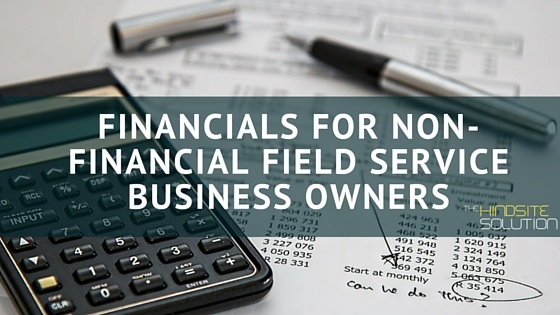
By Taylor Tuomie
I was on a webinar the other day hosted by Andrew Patricio of BizLaunch. It was called Financials for Non-Financial Small Business Owners. He kicked off the webinar by saying that he was NOT an accountant, but just a business owner who understands financial statements. It was an interesting topic because I started to think about most of the small business owners that I know.
Most of them aren’t financial wizards.
But the successful ones seem to do a few things very well when it comes to their financials. Here are 5 things that I learned from Andrew’s webinar that can help non-financial field service business owners understand their finances.
Budgets
Having budgets in place is a necessity. They act as a guideline for all of your business activities. A good budget for your field service business can also help you set future goals. If you exceed your budget regularly, you might need to make some adjustments to your daily operations or it might be a good indicator that you should be increasing your prices and decreasing your expenditures.
Andrew also stated that all of your employees should be on the same page and that a budget should be communicated. They should be aware that each dollar spent goes against your business’ bottom line, which harms them as well.
Income Statement
An income statement measures the performance of the business for a month, a quarter or a year. It is like a report card for your business’ performance. It’s a comprehensive record of all income that has been made and expenditures incurred, which you should be analyzing every step of the way.
Here is a free income statement template you can download:
http://www.bizlaunch.com/free-small-business-tools#tool5
Balance sheet
Simply put, a balance sheet is everything that the business owns and everything the business owes. Usually this is made up of “stuff” - your equipment, your trucks, etc.
Andrew made the point in his webinar that we grow our business not by holding on to cash, but by turning cash over. This is where you can see how that cash has been put to work.
Here is a free balance sheet template you can download: http://www.bizlaunch.com/free-small-business-tools#tool1
Cash Flow Forecast
You never, ever want to run out of cash (he made this point a few times… must be important!). Cash flow forecasts show you how much you’ll expect to have coming in and how much is going out. It is a good way to stop problems before they even take place.
Forecasts can also help when you’re dealing with banks, too. They can show your ability to repay loans and how quickly. A well put together cash flow forecast should help with your future budgeting as well.
How to Improve Cash Flow
- Reduce the amount of time you allow people to pay
- Adjust your prices
- Reduce cost of sales
- Reduce expenses
- Monitor marketing and advertising (it pains me as a marketer to write this)
Here is a free cash flow forecast you can download:
http://www.bizlaunch.com/free-small-business-tools#tool4
Know your Break-Even
Using a break-even every year or every month, you can figure out how long it would take to earn back money spent on either new employees or new equipment. Say you feel like you need to hire on a new service tech, you can see exactly how many man hours they would have to work in order to earn back the money you spent on hiring.
A break-even is a pragmatic approach to making decisions about money.
Here is a free break-even template you can download:
http://www.bizlaunch.com/free-small-business-tools#tool2
Andrew’s Tip
One piece of advice that seemed to keep coming up was that all small business owners should hire an accountant. He said that it will save you time and money. Also, he said that it is important that you find someone who knows your industry and is someone that you can understand.
Want to learn how our software can help you take charge of your field service business finances? Check out our demo video below.








